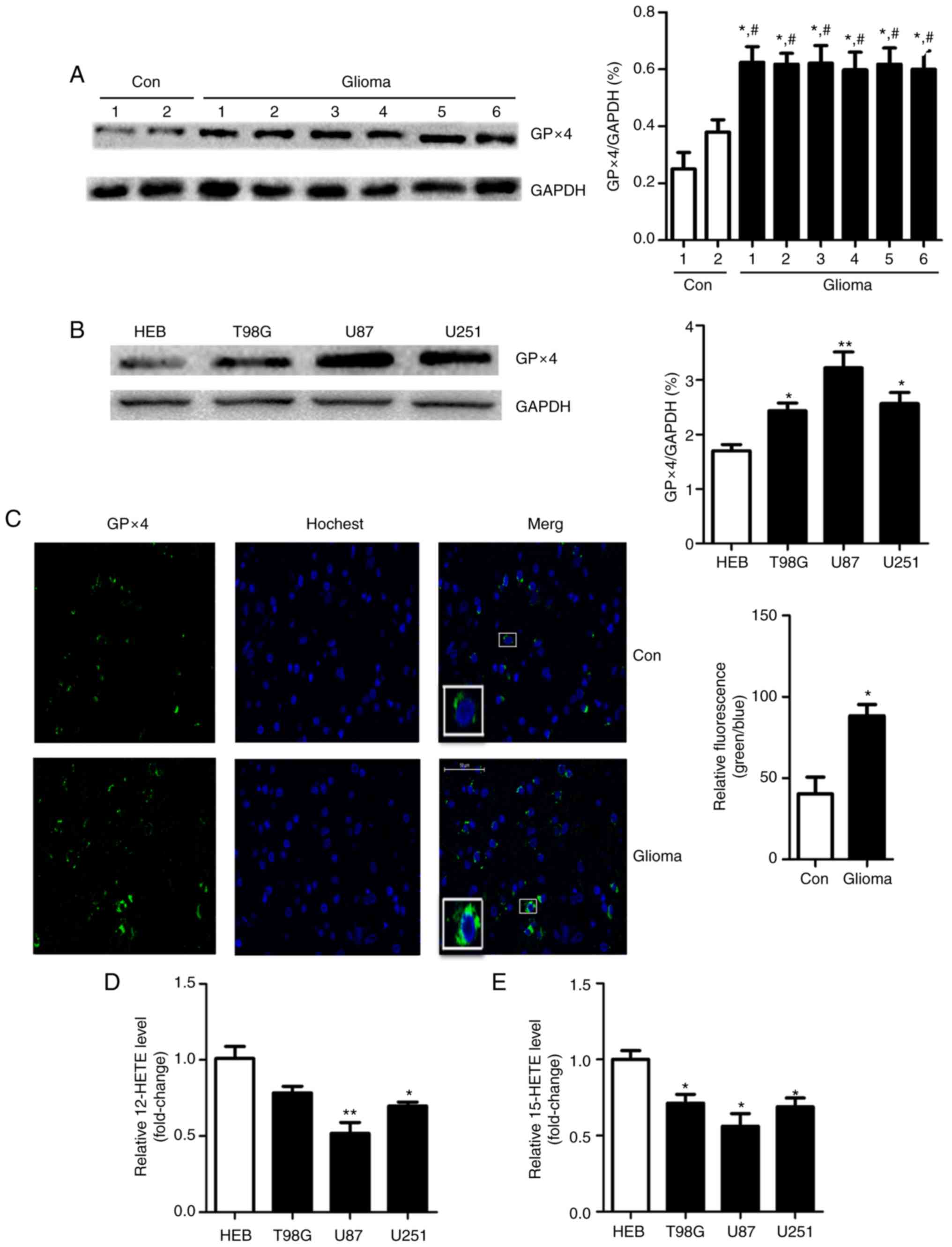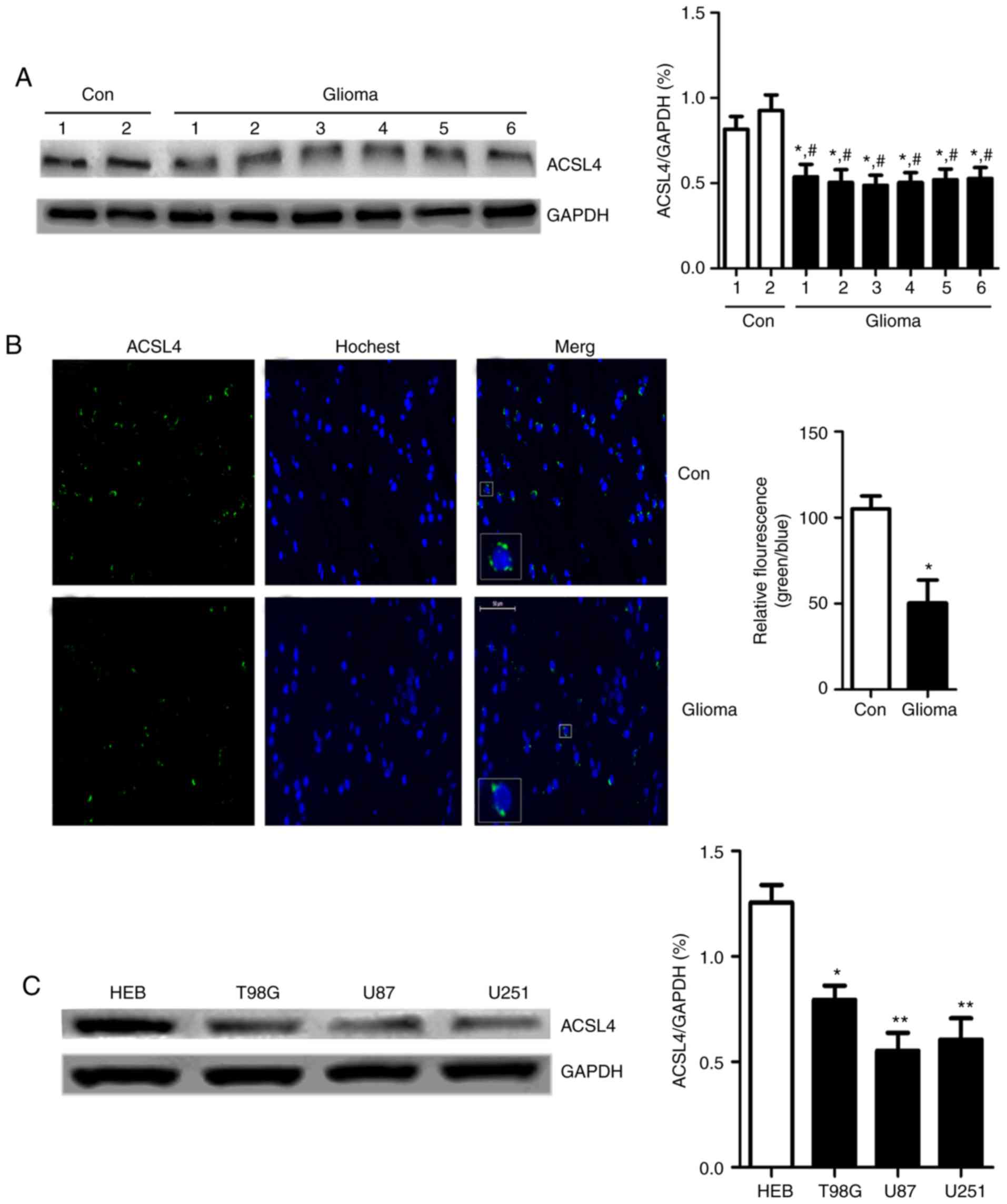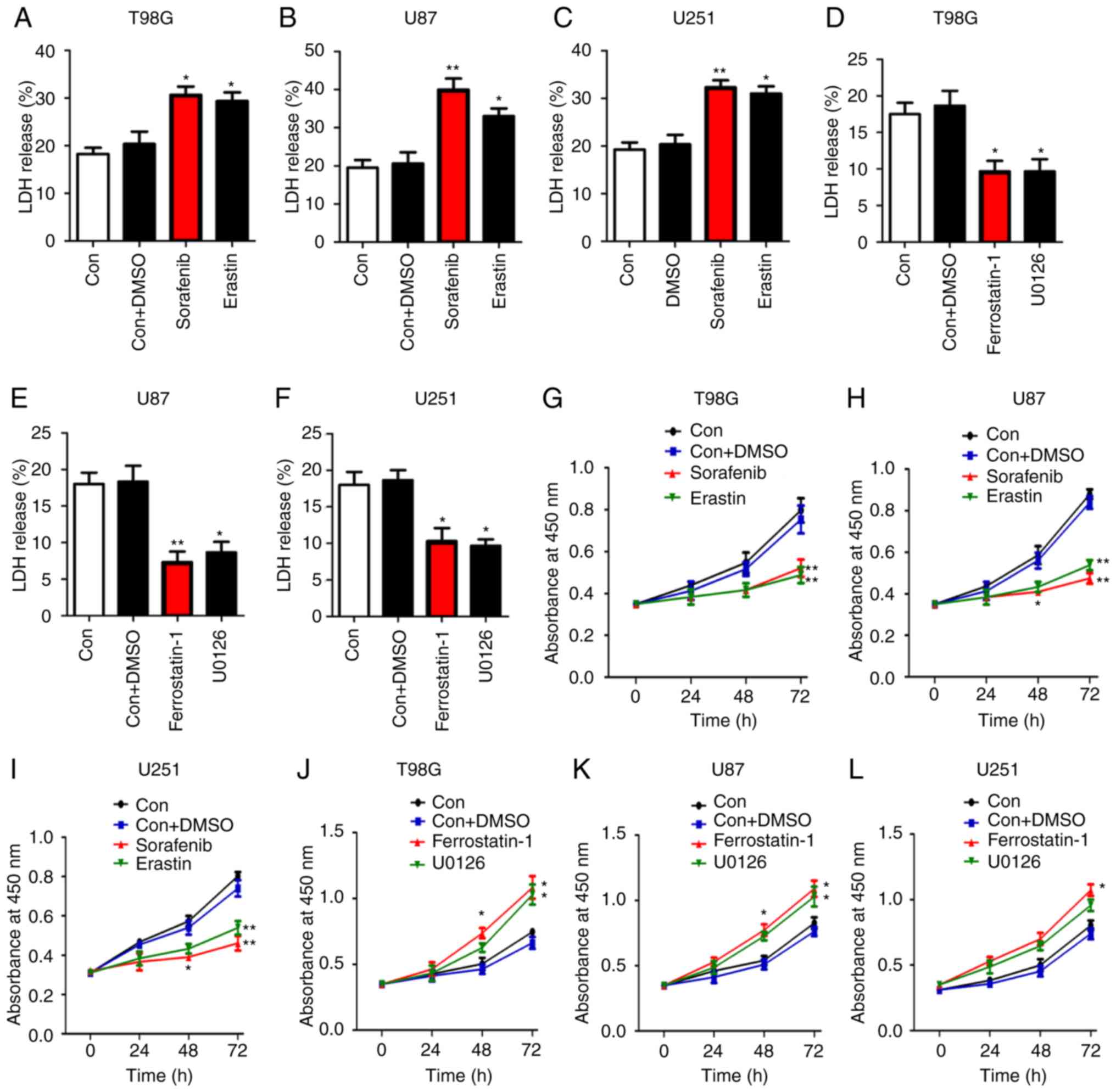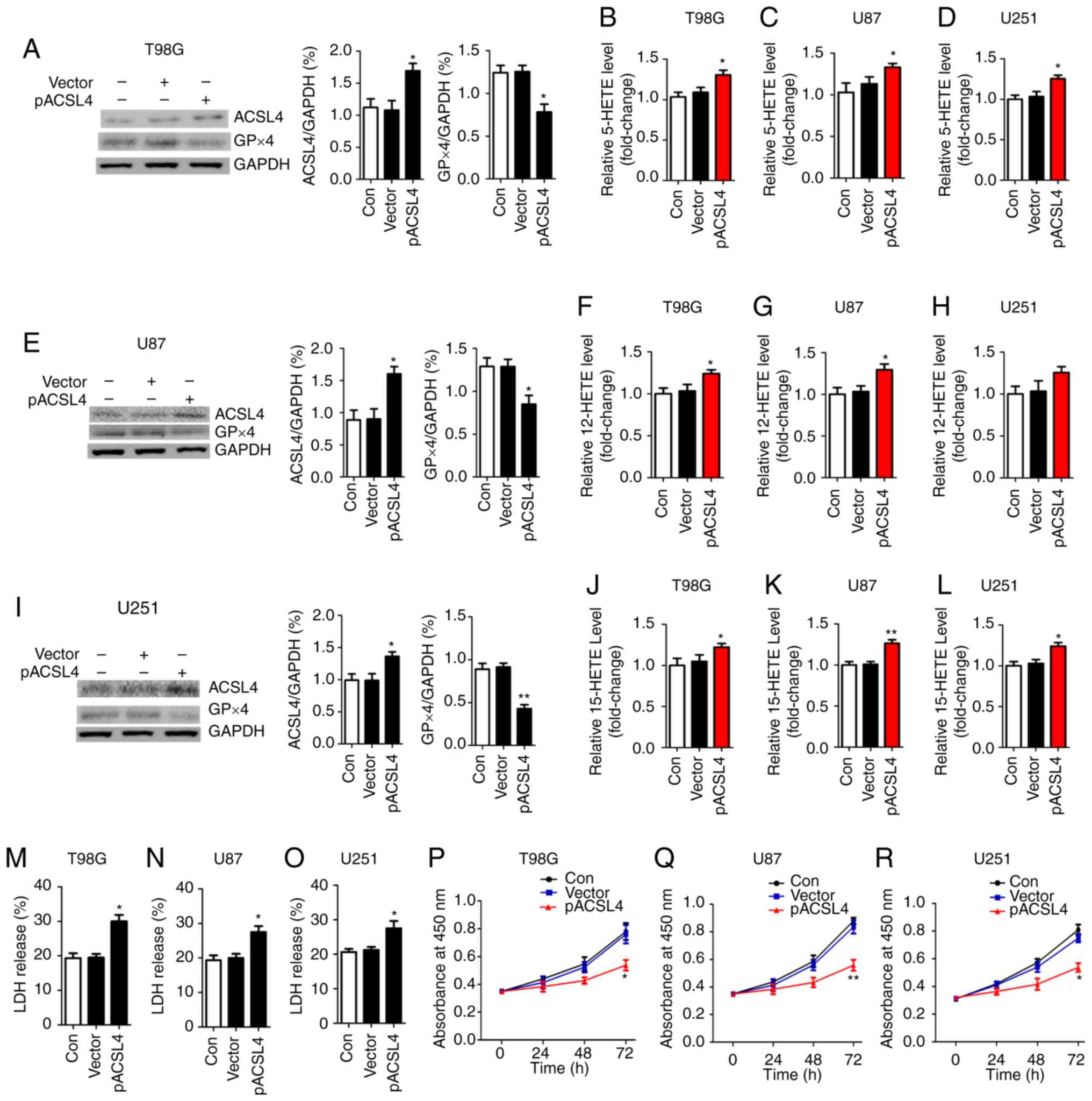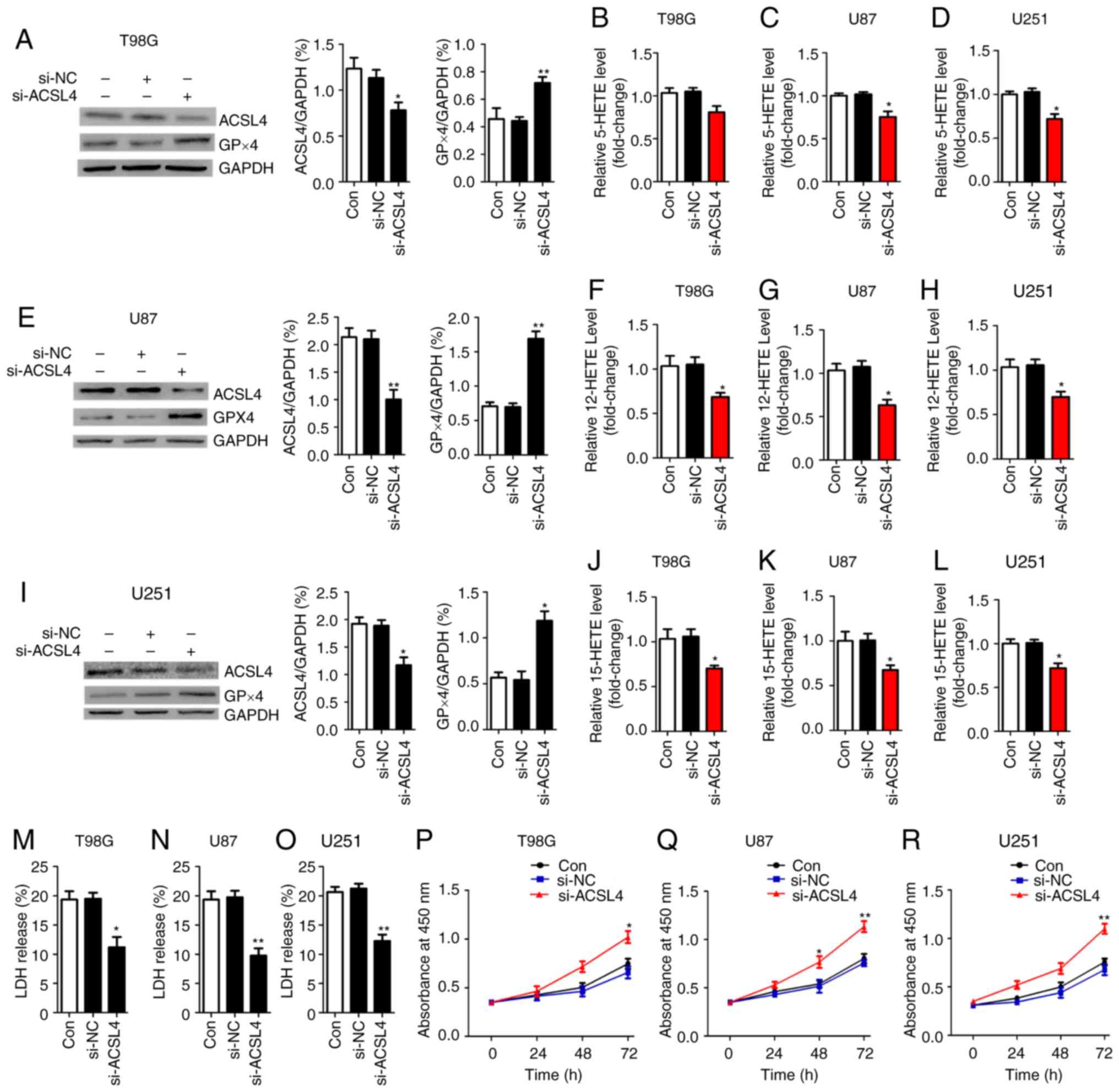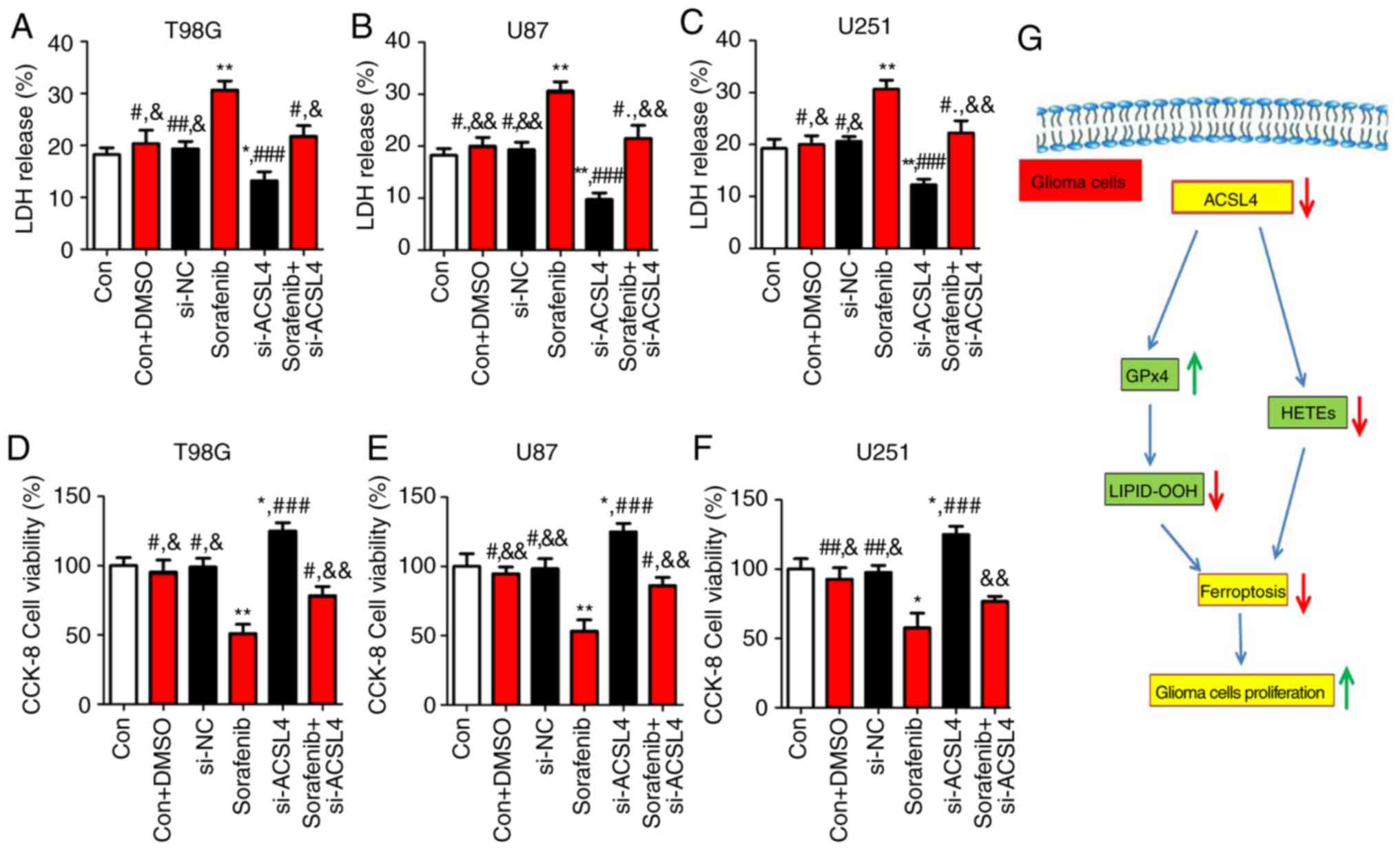|
1
|
Davis FG and McCarthy BJ: Current
epidemiological trends and surveillance issues in brain tumors.
Expert Rev Anticancer Ther. 1:395–401. 2001. View Article : Google Scholar : PubMed/NCBI
|
|
2
|
Norden AD, Drappatz J and Wen PY: Novel
anti-angiogenic therapies for malignant gliomas. Lancet Neurol.
7:1152–1160. 2008. View Article : Google Scholar : PubMed/NCBI
|
|
3
|
Fatehi M, Hunt C, Ma R and Toyota BD:
Persistent disparities in survival for patients with glioblastoma.
World Neurosurg. 120:e511–e516. 2018. View Article : Google Scholar : PubMed/NCBI
|
|
4
|
Lee A, Youssef I, Osborn VW, Safdieh J,
Becker DJ and Schreiber D: The utilization of MGMT promoter
methylation testing in United States hospitals for glioblastoma and
its impact on prognosis. J Clin Neurosci. 51:85–90. 2018.
View Article : Google Scholar : PubMed/NCBI
|
|
5
|
Alifieris C and Trafalis DT: Glioblastoma
multiforme: Pathogenesis and treatment. Pharmacol Ther. 152:63–82.
2015. View Article : Google Scholar : PubMed/NCBI
|
|
6
|
Gramatzki D, Frei K, Cathomas G, Moch H,
Weller M and Mertz KD: Interleukin-33 in human gliomas: Expression
and prognostic significance. Oncol Lett. 12:445–452. 2016.
View Article : Google Scholar : PubMed/NCBI
|
|
7
|
Jiang T, Mao Y, Ma W, Mao Q, You Y, Yang
X, Jiang C, Kang C, Li X, Chen L, et al: CGCG clinical practice
guidelines for the management of adult diffuse gliomas. Cancer
Lett. 375:263–273. 2016. View Article : Google Scholar : PubMed/NCBI
|
|
8
|
Xie Y, Hou W, Song X, Yu Y, Huang J, Sun
X, Kang R and Tang D: Ferroptosis: Process and function. Cell Death
Differ. 23:369–379. 2016. View Article : Google Scholar : PubMed/NCBI
|
|
9
|
Latunde-Dada GO: Ferroptosis: Role of
lipid peroxidation, iron and ferritinophagy. Biochim Biophys Acta
Gen Subj. 1861:1893–1900. 2017. View Article : Google Scholar : PubMed/NCBI
|
|
10
|
Dixon SJ, Lemberg KM, Lamprecht MR, Skouta
R, Zaitsev EM, Gleason CE, Patel DN, Bauer AJ, Cantley AM, Yang WS,
et al: Ferroptosis: An iron-dependent form of nonapoptotic cell
death. Cell. 149:1060–1072. 2012. View Article : Google Scholar : PubMed/NCBI
|
|
11
|
Stockwell BR, Friedmann Angeli JP, Bayir
H, Bush AI, Conrad M, Dixon SJ, Fulda S, Gascón S, Hatzios SK,
Kagan VE, et al: Ferroptosis: A regulated cell death nexus linking
metabolism, redox biology, and disease. Cell. 171:273–285. 2017.
View Article : Google Scholar : PubMed/NCBI
|
|
12
|
Friedmann Angeli JP, Schneider M, Proneth
B, Tyurina YY, Tyurin VA, Hammond VJ, Herbach N, Aichler M, Walch
A, Eggenhofer E, et al: Inactivation of the ferroptosis regulator
Gpx4 triggers acute renal failure in mice. Nat Cell Biol.
16:1180–1191. 2014. View
Article : Google Scholar : PubMed/NCBI
|
|
13
|
Doll S, Proneth B, Tyurina YY, Panzilius
E, Kobayashi S, Ingold I, Irmler M, Beckers J, Aichler M, Walch A,
et al: ACSL4 dictates ferroptosis sensitivity by shaping cellular
lipid composition. Nat Chem Biol. 13:91–98. 2017. View Article : Google Scholar : PubMed/NCBI
|
|
14
|
Fan Z, Wirth AK, Chen D, Wruck CJ, Rauh M,
Buchfelder M and Savaskan N: Nrf2-Keap1 pathway promotes cell
proliferation and diminishes ferroptosis. Oncogenesis. 6:e3712017.
View Article : Google Scholar : PubMed/NCBI
|
|
15
|
Chen D, Fan Z, Rauh M, Buchfelder M,
Eyupoglu IY and Savaskan N: ATF4 promotes angiogenesis and neuronal
cell death and confers ferroptosis in a xCT-dependent manner.
Oncogene. 36:5593–5608. 2017. View Article : Google Scholar : PubMed/NCBI
|
|
16
|
Killion EA, Reeves AR, El Azzouny MA, Yan
QW, Surujon D, Griffin JD, Bowman TA, Wang C, Matthan NR, Klett EL,
et al: A role for long-chain acyl-CoA synthetase-4 (ACSL4) in
diet-induced phospholipid remodeling and obesity-associated
adipocyte dysfunction. Mol Metab. 9:43–56. 2018. View Article : Google Scholar : PubMed/NCBI
|
|
17
|
Bhutia YD and Ganapathy V: Glutamine
transporters in mammalian cells and their functions in physiology
and cancer. Biochim Biophys Acta. 1863:2531–2539. 2016. View Article : Google Scholar : PubMed/NCBI
|
|
18
|
Yu H, Guo P, Xie X, Wang Y and Chen G:
Ferroptosis, a new form of cell death, and its relationships with
tumourous diseases. J Cell Mol Med. 21:648–657. 2017. View Article : Google Scholar : PubMed/NCBI
|
|
19
|
Abeti R, Parkinson MH, Hargreaves IP,
Angelova PR, Sandi C, Pook MA, Giunti P and Abramov AY:
‘Mitochondrial energy imbalance and lipid peroxidation cause cell
death in Friedreich's ataxia’. Cell Death Dis. 7:e22372016.
View Article : Google Scholar : PubMed/NCBI
|
|
20
|
Wang H, An P, Xie E, Wu Q, Fang X, Gao H,
Zhang Z, Li Y, Wang X, Zhang J, et al: Characterization of
ferroptosis in murine models of hemochromatosis. Hepatology.
66:449–465. 2017. View Article : Google Scholar : PubMed/NCBI
|
|
21
|
Doll S and Conrad M: Iron and ferroptosis:
A still ill-defined liaison. IUBMB Life. 69:423–434. 2017.
View Article : Google Scholar : PubMed/NCBI
|
|
22
|
Cao JY and Dixon SJ: Mechanisms of
ferroptosis. Cell Mol Life Sci. 73:2195–2209. 2016. View Article : Google Scholar : PubMed/NCBI
|
|
23
|
Kagan VE, Mao G, Qu F, Angeli JP, Doll S,
Croix CS, Dar HH, Liu B, Tyurin VA, Ritov VB, et al: Oxidized
arachidonic and adrenic PEs navigate cells to ferroptosis. Nat Chem
Biol. 13:81–90. 2017. View Article : Google Scholar : PubMed/NCBI
|
|
24
|
Liao J, Tao X, Ding Q, Liu J, Yang X, Yuan
FE, Yang JA, Liu B, Xiang GA and Chen Q: SSRP1 silencing inhibits
the proliferation and malignancy of human glioma cells via the MAPK
signaling pathway. Oncol Rep. 38:2667–2676. 2017. View Article : Google Scholar : PubMed/NCBI
|
|
25
|
Yuan H, Li X, Zhang X, Kang R and Tang D:
Identification of ACSL4 as a biomarker and contributor of
ferroptosis. Biochem Biophys Res Commun. 478:1338–1343. 2016.
View Article : Google Scholar : PubMed/NCBI
|
|
26
|
Kumar P, Nagarajan A and Uchil PD:
Analysis of cell viability by the lactate dehydrogenase assay. Cold
Spring Harb Protoc. 2018:2018. View Article : Google Scholar
|
|
27
|
Shan Y, Liu B, Li L, Chang N, Li L, Wang
H, Wang D, Feng H, Cheung C, Liao M, et al: Regulation of PINK1 by
NR2B-containing NMDA receptors in ischemic neuronal injury. J
Neurochem. 111:1149–1160. 2009. View Article : Google Scholar : PubMed/NCBI
|
|
28
|
Curtis MJ, Bond RA, Spina D, Ahluwalia A,
Alexander SP, Giembycz MA, Gilchrist A, Hoyer D, Insel PA, Izzo AA,
et al: Experimental design and analysis and their reporting: New
guidance for publication in BJP. Br J Pharmacol. 172:3461–3471.
2015. View Article : Google Scholar : PubMed/NCBI
|
|
29
|
Imai H, Matsuoka M, Kumagai T, Sakamoto T
and Koumura T: Lipid peroxidation-dependent cell death regulated by
GPx4 and ferroptosis. Curr Top Microbiol Immunol. 403:143–170.
2017.PubMed/NCBI
|
|
30
|
Prabst K, Engelhardt H, Ringgeler S and
Hübner H: Basic colorimetric proliferation assays: MTT, WST, and
resazurin. Methods Mol Biol. 1601:1–17. 2017. View Article : Google Scholar : PubMed/NCBI
|
|
31
|
Louandre C, Marcq I, Bouhlal H, Lachaier
E, Godin C, Saidak Z, François C, Chatelain D, Debuysscher V,
Barbare JC, et al: The retinoblastoma (Rb) protein regulates
ferroptosis induced by sorafenib in human hepatocellular carcinoma
cells. Cancer Lett. 356:971–977. 2015. View Article : Google Scholar : PubMed/NCBI
|
|
32
|
Geng N, Shi BJ, Li SL, Zhong ZY, Li YC,
Xua WL, Zhou H and Cai JH: Knockdown of ferroportin accelerates
erastin-induced ferroptosis in neuroblastoma cells. Eur Rev Med
Pharmacol Sci. 22:3826–3836. 2018.PubMed/NCBI
|
|
33
|
Li Y, Feng D, Wang Z, Zhao Y, Sun R, Tian
D, Liu D, Zhang F, Ning S, Yao J and Tian X: Ischemia-induced ACSL4
activation contributes to ferroptosis-mediated tissue injury in
intestinal ischemia/reperfusion. Cell Death Differ. 26:2284–2299.
2019. View Article : Google Scholar : PubMed/NCBI
|
|
34
|
Forcina GC and Dixon SJ: GPX4 at the
crossroads of lipid homeostasis and ferroptosis. Proteomics.
19:e18003112019. View Article : Google Scholar : PubMed/NCBI
|
|
35
|
Zhou B, Liu J, Kang R, Klionsky DJ,
Kroemer G and Tang D: Ferroptosis is a type of autophagy-dependent
cell death. Semin Cancer Biol. Mar 14–2019.(Epub ahead of print).
doi: 10.1016/j.semcancer.2019.03.002. View Article : Google Scholar :
|
|
36
|
Lei P, Bai T and Sun Y: Mechanisms of
ferroptosis and relations with regulated cell death: A review.
Front Physiol. 10:1392019. View Article : Google Scholar : PubMed/NCBI
|
|
37
|
Dixon SJ and Stockwell BR: The role of
iron and reactive oxygen species in cell death. Nat Chem Biol.
10:9–17. 2014. View Article : Google Scholar : PubMed/NCBI
|
|
38
|
Ivanov SD, Semenov AL, Mikhelson VM,
Kovan'ko EG and Iamshanov VA: Effects of iron ion additional
introduction in radiation therapy of tumor-bearing animals. Radiats
Biol Radioecol. 53:296–303. 2013.(In Russian). PubMed/NCBI
|
|
39
|
Wang Z, Ding Y, Wang X, Lu S, Wang C, He
C, Wang L, Piao M, Chi G, Luo Y and Ge P: Pseudolaric acid B
triggers ferroptosis in glioma cells via activation of Nox4 and
inhibition of xCT. Cancer Lett. 428:21–33. 2018. View Article : Google Scholar : PubMed/NCBI
|
|
40
|
Sehm T, Rauh M, Wiendieck K, Buchfelder M,
Eyüpoglu IY and Savaskan NE: Temozolomide toxicity operates in a
xCT/SLC7a11 dependent manner and is fostered by ferroptosis.
Oncotarget. 7:74630–74647. 2016. View Article : Google Scholar : PubMed/NCBI
|
|
41
|
Dixon SJ, Patel DN, Welsch M, Skouta R,
Lee ED, Hayano M, Thomas AG, Gleason CE, Tatonetti NP, Slusher BS
and Stockwell BR: Pharmacological inhibition of cystine-glutamate
exchange induces endoplasmic reticulum stress and ferroptosis.
Elife. 3:e025232014. View Article : Google Scholar : PubMed/NCBI
|
|
42
|
Wang L, Liu Y, Du T, Yang H, Lei L, Guo M,
Ding HF, Zhang J, Wang H, Chen X and Yan C: ATF3 promotes
erastin-induced ferroptosis by suppressing system Xc. Cell Death
Differ. Jul 4–2019.(Epub ahead of print). doi:
10.1038/s41418-019-0380-z.
|
|
43
|
Xiao FJ, Zhang D, Wu Y, Jia QH, Zhang L,
Li YX, Yang YF, Wang H, Wu CT and Wang LS: miRNA-17-92 protects
endothelial cells from erastin-induced ferroptosis through
targeting the A20-ACSL4 axis. Biochem Biophys Res Commun.
515:448–454. 2019. View Article : Google Scholar : PubMed/NCBI
|
|
44
|
Soupene E and Kuypers FA: Mammalian
long-chain acyl-CoA synthetases. Exp Biol Med (Maywood).
233:507–521. 2008. View Article : Google Scholar : PubMed/NCBI
|
|
45
|
Ellis JM, Frahm JL, Li LO and Coleman RA:
Acyl-coenzyme A synthetases in metabolic control. Curr Opin
Lipidol. 21:212–217. 2010. View Article : Google Scholar : PubMed/NCBI
|
|
46
|
Coleman RA, Lewin TM, Van Horn CG and
Gonzalez-Baró MR: Do long-chain acyl-CoA synthetases regulate fatty
acid entry into synthetic versus degradative pathways? J Nutr.
132:2123–2126. 2002. View Article : Google Scholar : PubMed/NCBI
|
|
47
|
Kang MJ, Fujino T, Sasano H, Minekura H,
Yabuki N, Nagura H, Iijima H and Yamamoto TT: A novel
arachidonate-preferring acyl-CoA synthetase is present in
steroidogenic cells of the rat adrenal, ovary, and testis. Proc
Natl Acad Sci USA. 94:2880–2904. 1997. View Article : Google Scholar : PubMed/NCBI
|















